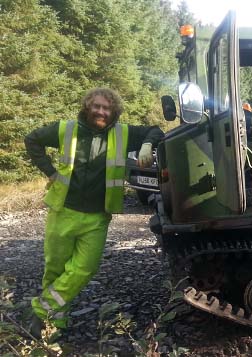 The Society’s Distinguished Geologists Memorial Trust offers a funding lifeline, says James Whiteley.
The Society’s Distinguished Geologists Memorial Trust offers a funding lifeline, says James Whiteley.
Working in a relatively small and competitive commercial environment, the feelings of revelation when you attend an international event such as Near Surface Geophysics (as I did, in September 2014) is huge (see this month’s Online Special).
During five days in Athens, I spoke to people from all aspects of the near-surface geophysics and geoscience community. But I spoke to them as collaborators, not competitors; to geoscientists, not people branded as either ‘academic’ or ‘practitioner’. I realised that the same geoscientific problems we face in the UK are mirrored across the globe, and that there are many people dedicated to advancing the application of near-surface geophysics, not just for academic or commercial gain, but because they believe in its huge potential in tackling pertinent geoscientific issues.
Downside
Yet, if there is a downside to an event like this, it is that it is still too expensive for many employees from small to medium sized commercial companies to attend - though this is not necessarily a fault of the organisers. In addition to the primary cost of sending someone overseas for a week comes the secondary financial impact that taking an employee out of the field for five days can have on a company - worse still, if you are a self-employed consultant. Unsurprisingly therefore, despite a high turnout of ‘practitioners’, commercial ‘users’ of geophysics seemed somewhat under-represented. If the central premise of my Online Special article (namely, that the influence of practical experience is highly important for the direction of applied research) is acceptable, then this problem must be addressed in future.
My trip to Athens was paid for by the Society’s Distinguished Geologists Memorial Trust Fund. Unlike many grants available, the DGMT fund is open to any GSL Fellow looking to achieve chartered status. You don’t have to be a student, you don’t have to work in academic research; but you must have a project with a clearly defined goal and purpose. Criteria for funding like these are far and few between.
Funding
The DGMT fund is not there solely to allow commercial workers to attend academic events, but it is one of the few funding sources available to practitioners wishing to attend such events without having to rely on their own or their company’s money. With academic funding dwindling in a post-recession UK and unlikely to recover as quickly as the private sector, a higher number of would-be academics may turn to industry in the coming years. This will undoubtedly be a boost to small geoscience companies, but it would be a shame if they were to lose touch with academe entirely, or indeed for any of us who retain an interest in where the future of our field lies.
The benefits of making such funding more readily available to employees of small companies would be huge, and would help preserve the link between industry and research that benefits so many areas of geoscience.
Jim Whiteley